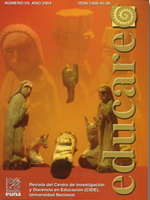Los talleres de educación de la sexualidad y la afectividad en los adolescentes como medio de prevención del abuso sexual. (Una propuesta metodológica y teórica)
DOI:
https://doi.org/10.15359/ree.2004-7.3Abstract
Based on the contributions made by Erich Fromm, in regards to the concept of “having and being”, the author proposes the development of a workshop aimed at preventing sexual abuse of adolescents. In this way, she tries to attract youngsters more into the attitude of “being” rather than into that of “having”. Likewise, the participants' concept of sexuality before and after the workshop is discussed. This article is completed whit the supplement (“My sexuality”) written by psychologist Pamela Delgado, and addressed to fourth, fifth and sixth graders. It complements the magazine you are reading.
References
Cavanagh. (En Mezerville, Gastón) (1999). Madurez sacerdotal y religiosa. Tomos I y II. Bogotá: Consejo Episcopal Latinoamericano
Frankl, V. (1994). El hombre en busca de sentido. Madrid: Biblioteca de Psicología.
Fromm, E. (1992). ¿Ser o tener?. México: Fondo de Cultura Económica.
Fromm, E. (1992). Del tener al ser. Los recodos de la conciencia. México D.F.: Fondo de Cultura Económica.
Murillo, M. (1998). Los talleres de educación sexual con adolescentfs.
Ponencia, Congreso Nacional de Psicología. San José, Costa Rica.
Murillo, M. (Noviembre, 1999). Un encuentro conmigo. Taller. Foro de las Américas. Educación en valores. Tlaxcala, México.
Murillo, M. (Noviembre, 1999). Educación para una relación más profunda con la vida. Ponencia. Foro de las Américas. Tlaxcala.
Murillo, M. (2002). Lo cualitativo y lo cuantitativo. Una experiencia de
campo. Metodología de abordaje en educación sexual. Congreso Nacional de Psicología, Costa Rica.
Murillo, M. (2001). La elaboración que un grupo de adolescentes de décimo nivel hacen acerca de la conceptualización de la sexualidad. Tesis para optar el grado de Maestría en Psicología. Sistema de Estudios de Posgrado. Maestría en Investigación en Psicología. Universidad de Costa Rica.
Murillo, M. (Abril, 2004). El lenguaje de la sexualidad. Propuestas
interdisciplinarias en Educación Sexual. Congreso Nacional de Sexualidad. San José: Memorias del Congreso.
Ross, M. P. (1998). Modelo Global de Intervención en Sexología Clínica. Formación y capacitación. San José: Asociación de Religiosos y Religiosas de Costa Rica.
Sanz, F. (1999). Psicoerotismo femenino y masculino. Para unas relaciones placenteras, autónomas y justas. Barcelona: Editorial Kairós.
Published
How to Cite
Issue
Section
License
1. In case the submitted paper is accepted for publication, the author(s) FREELY, COSTLESS, EXCLUSIVELY AND FOR AN INDEFINITE TERM transfer copyrights and patrimonial rights to Universidad Nacional (UNA, Costa Rica). For more details check the Originality Statement and Copyright Transfer Agreement
2. REUTILIZATION RIGHTS: UNA authorizes authors to use, for any purpose (among them selfarchiving or autoarchiving) and to publish in the Internet in any electronic site, the paper´'s final version, both approved and published (post print), as long as it is done with a non commercial purpose, does not generate derivates without previous consentment and recognizes both publisher's name and authorship.
3. The submission and possible publication of the paper in the Educare Electronic Journal is ruled by the Journal’s editorial policies, the institutional rules of Universidad Nacional and the laws of the Republic of Costa Rica. Additionally, any possible difference of opinion or future dispute shall be settled in accordance with the mechanisms of Alternative Dispute Resolution and the Costa Rican Jurisdiction.
4. In all cases, it is understood that the opinions issued are those of the authors and do not necessarily reflect the position and opinion of Educare, CIDE or Universidad Nacional, Costa Rica. It is also understood that, in the exercise of academic freedom, the authors have carried out a rogorous scientific-academic process of research, reflection and argumentation thar lays within the thematic scope of interest of the Journal.
5. The papers published by Educare Electronic Journal use a Creative Commons License:














 The articles published by Educare Electronic Journal can be shared with a Creative Commons License:
The articles published by Educare Electronic Journal can be shared with a Creative Commons License: 



